When Jerimiah Williams left the David Rose School for children with special needs he was employed at a supermarket as a bag-packer, even though there were obvious signs that he was an intelligent young man who could achieve much more.
Because he was deaf there was the belief that a bag-packer was as far as he could go, but members of the Deaf Association of Guyana persuaded the young man to attend the Guyana Industrial Training Centre (GITC) where notwithstanding the fact that the classes did not cater for his needs he successfully completed his studies and today is employed with a well-known company and helps to assemble the heavy-duty vehicles they import.
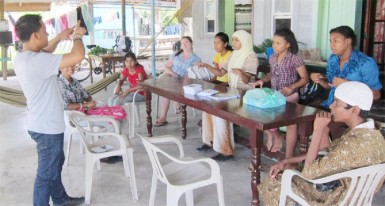
Williams is one of the many deaf students that the Deaf Association has helped since it was formed in 2008, and it continues to work with students from across the country more specifically with those from the four schools for children with special needs located in Linden, Diamond, Georgetown and New Amsterdam.
President and founding member of the association Sabine McIntosh in an interview with Sunday Stabroek expressed the hope that one day the association would be fully managed by persons who are deaf and it is working on laying the foundation for this. It is hoped that by catering for the needs of the deaf and creating opportunities for them to achieve there will be role models to inspire others to always aim high.
The association has been working in various areas with children and adults who are deaf, focusing on education, sports, drama and arts and it is hoped that soon they will have a centre once the promised monetary assistance from the Ministry of Human Services & Social Security becomes a reality.
McIntosh revealed that she became involved because her granddaughter is deaf, and even though the child now lives in the US she wants to continue to work with association to create opportunities for the deaf. Initially they focused on deaf persons being involved in the performing arts, but they later branched out to education, sports and sign language.
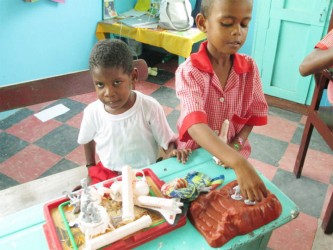
“We got involved because we realized that there isn’t much going on; it was like a vacuum, so what we are trying to do… [is] collaborate with the relevant ministries in the best way that we can…” McIntosh said, adding that more and more they are focusing on deaf youths in school.
In an effort to assist the children in their educational pursuits she said they started the annual “Finger-Spelling Bee Competi-tion,” and this has invigorated finger-spelling in deaf classrooms in the special needs schools. She said the finger spelling is a pre-requisite for the children to learn the English language. This year Courts Guyana is sponsoring the competition.
But top on the list of achievements education wise is the establishment of a small school ‒Tuschen Deaf Academy ‒ which has ten students with classes being held under the home of Tuschen resident who has a deaf daughter. The students are taught by a deaf teacher and she said the majority of them have never attended school are now very excited to do so. They also relate well to James Williams, the teacher.
“They are making progress,” she said, indicating that the children attend classes three times a week in the afternoons.
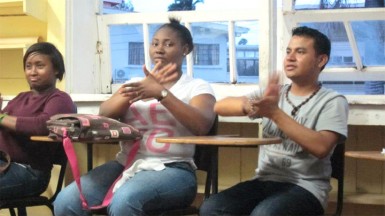
The school was started at the beginning of this year with funding from the British High Commission and is now supported by the Ministry of Education which pays the teacher a stipend. McIntosh feels that the ministry will eventually incorporate the school into a regular primary school but with a deaf classroom, which would be the first in the country. The association hopes to start a similar school in Corriverton.
Performing arts
The association has also formed a drumming group comprising deaf children from the school in Diamond; they are called the ‘Diamond Drummers’ and there are seven members. She said that the group is popular and would perform at functions held by the Ministry of Education and Ministry of Human Services, and even at events of other organisations. Persons are always intrigued, she observed, that they can drum even though they are deaf.
McIntosh said that their teacher has “worked a miracle with them” and they are supported by various groups, while the Guyana Telephone & Telegraph Company has promised to sponsor them for this year. Recently they performed for the Rotary Club of South Georgetown and in return the club will purchase “two real drums” for the group.
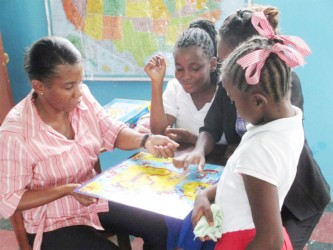
Once a year the association holds a cultural show where performers from the various schools are given a stage to display their talents. In New Amsterdam there is a student and adult group and according to McIntosh the association only supports them as they are good at “doing their own thing and are doing very well.” They also took part in the Guyana Music Festival and while they were the only ones in their category they performed superbly.
At Davis Rose the association supports ongoing dance classes two times a week which would see someone from Creative Arts teaching interested children to dance. Those who do exceptionally well are enrolled with the National School of Dance and presently there are seven children from Davis Rose enrolled, while five danced at the Independence celebration held at the National Park last Saturday. The dance programme is made possible by the United Women for Special Children who make an annual donation to the association. The group also supports a six-week summer camp at Davis Rose where the children are taught drama and are prepared for the annual show held in September.
Interestingly some deaf youths will be performing at Carifesta this year which is to be held in Suriname, and they are to be accommodated in the dormitory of the only school for the deaf in that country. They will work together with the deaf children in that country and perform together with them.
“We are very excited about that, and it is a big outing and a big opportunity for the children,” McIntosh said, going on to note that by getting the children involved in drama and dance their personalities are developed.
Sports
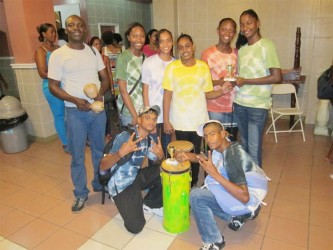
McIntosh said the association is also working on getting the children involved in sports activities, and while football is popular, the schools do not have grounds to support it. As a result she said they selected table tennis as the game for the children to work with, since all of the schools have space to accommodate this.
And this is not being done in a vacuum as next year it is hoped that the children will compete in the table tennis category at the Deaf Caribbean sporting event in Trinidad next year. The association is grateful to Rubis Guyana Inc for donating four tables, nets and balls and other items. Before the year is out the deaf table tennis competition will be held with the usual support from the Ministry of Culture, Youth & Sport.
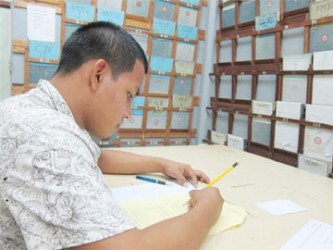
Next Friday the association will also convene a day of games for the children involving mostly scrabble, chess, chinese checkers and draughts. The schools have been asked to send in their best players ‒ the association provides the games ‒ and they will compete at the Carifesta Sports Complex.
According to McIntosh the Chess Federation sent some of their top players to train a few of the association’s players, who in turn visit the various schools and work with the children. She said they want to push the game so that the children will become enthused, so even if representatives from the association are not around they would still play.
Indigenous sign language
Importantly, the association hopes to establish a dictionary of sign language that is indigenous to Guyana, and she said this would entail travelling throughout the country. Proposals have since been made to UNICEF and the Japan International Cooperation Agency (JICA) and she hopes that funding will be provided to make the dictionary a reality. It does not have to be printed but can be in software format and function as a database from which material could be developed for the various age groups. She said it would be done in collaboration with Trinidad, which has a linguistics department and where sign language is taught at university level.
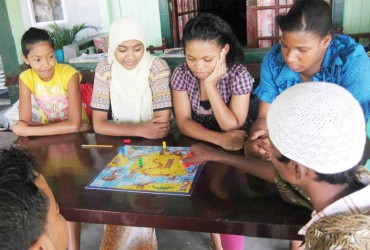
At present there is a Peace Corps volunteer attached to the association and she conducts sign language classes at the Institute of Distance Education, and these will be ongoing.
She pointed out that the biggest challenge for deaf education is the poor ability of the teachers to communicate through sign language. And she emphasised it is important that the children are exposed to early intervention so that they can learn the language.
Another challenge for the deaf community is the lack of vocational training opportunities, making it difficult for them to find employment so that most times they end up working as a porter at a hospital or packing bags at a supermarket. She said that there are a few companies who employ deaf persons, and the association will approach these whenever they see someone with potential.
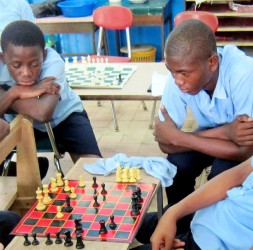
McIntosh said what is needed in Guyana is deaf leadership, and the association hopes to lay the foundation and develop leadership. One way of achieving this, McIntosh said, is to encourage schools to have clubs in the deaf classrooms and then the association can interact directly with the leaders of the clubs. At present the association has three deaf persons on the executive as ideally it is hoped that it will be run by the deaf. The association is an associate member of the World Federation for the Deaf and will become a full member when it is manned by deaf persons.




